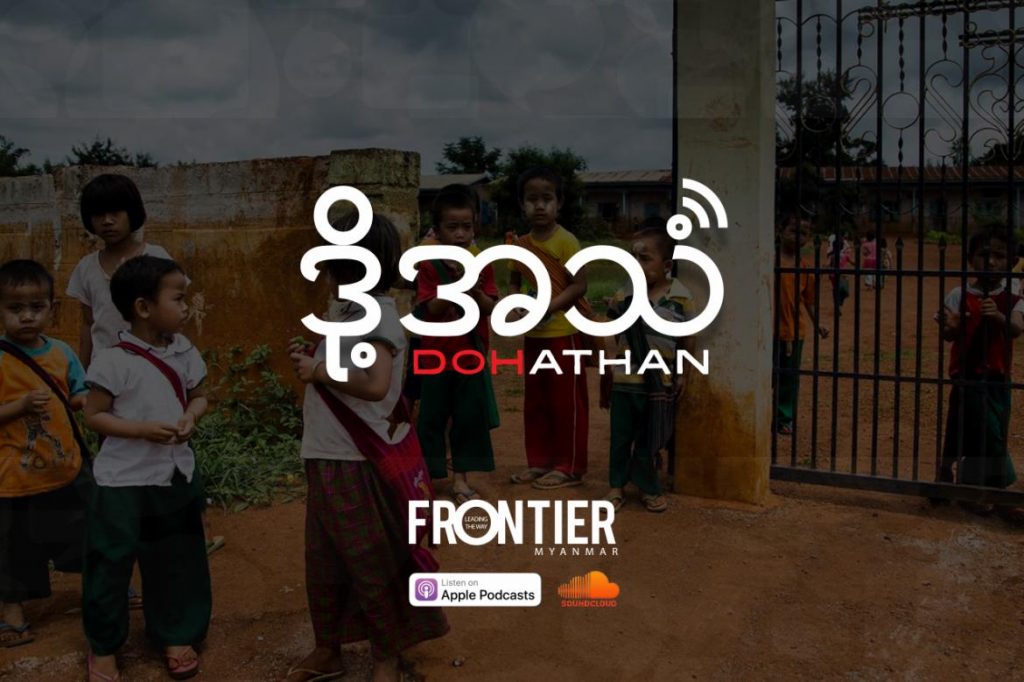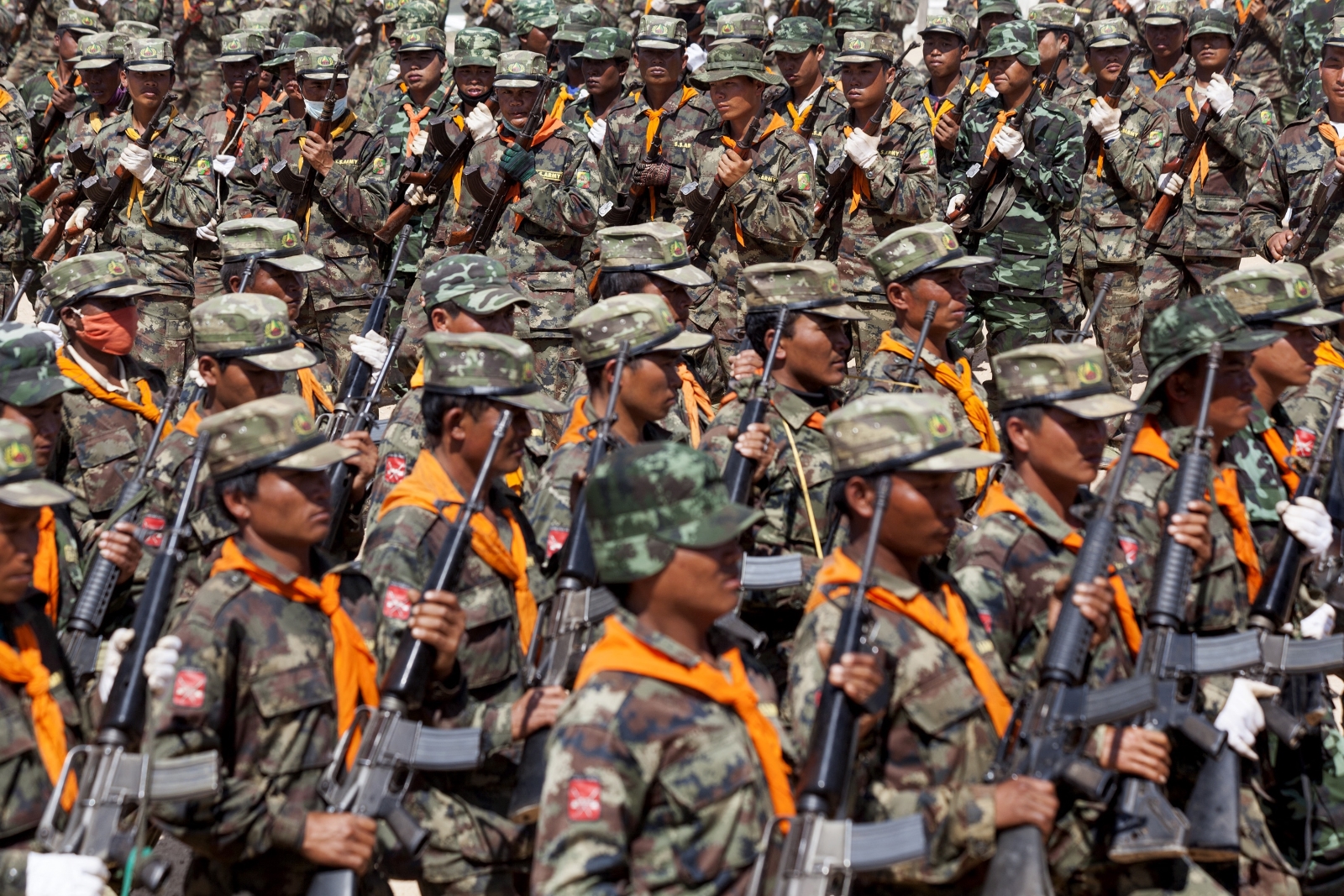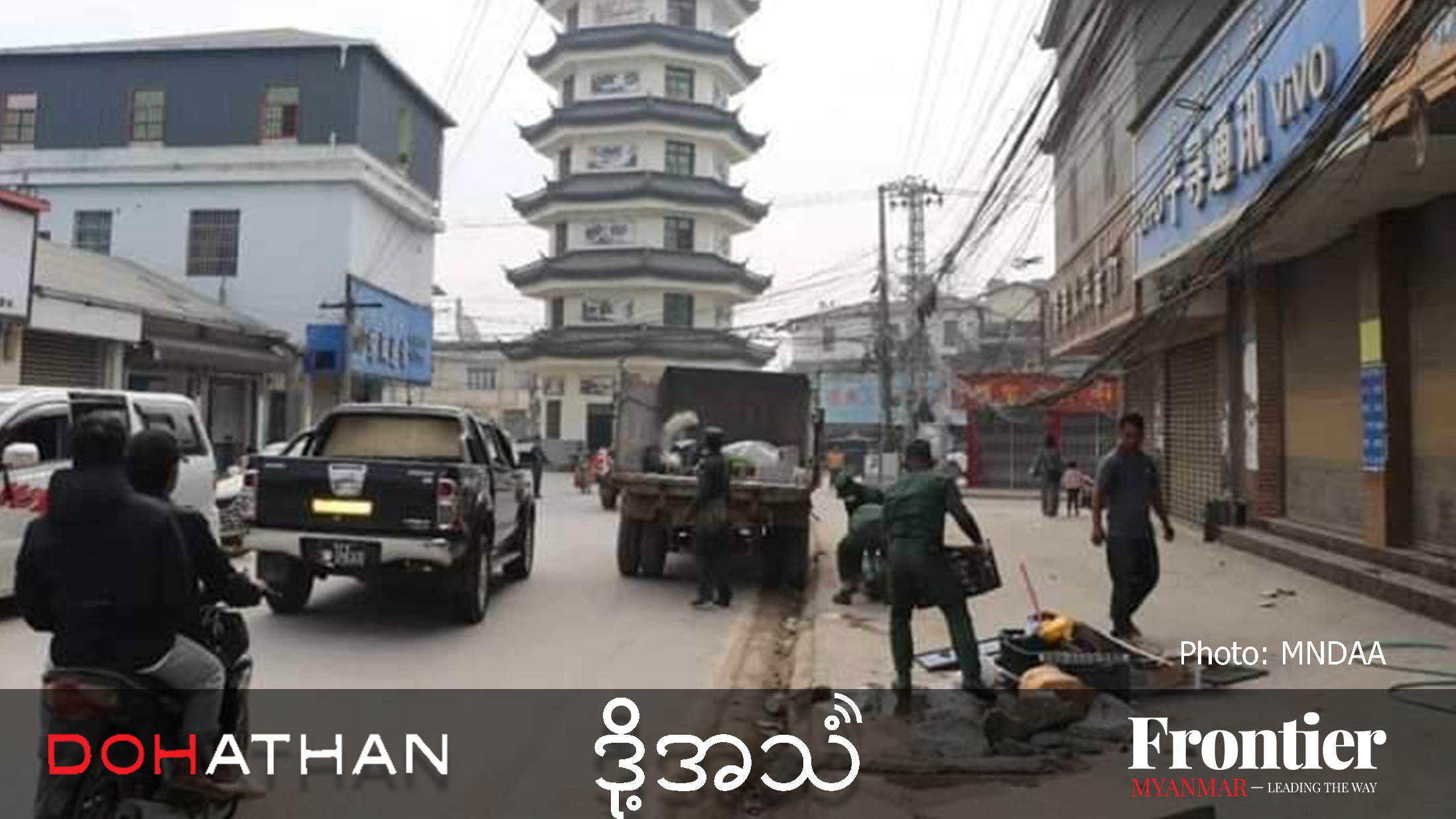This week we hear about the growing education problem for the Pa’O people of Shan State, where children are forced to leave their villages in search of better schooling in Yangon and elsewhere in Myanmar. Listen on Soundcloud or YouTube below.
Episode 10 script
Win Zar Ni Aung: Mingalabar, welcome to Doh Athan, a new weekly podcast from Frontier Myanmar. I am Zar Ni.
Our pioneering audio programme, the first of its kind in Myanmar, helps shine a spotlight on the many human rights issues that affect people across this beautiful country.
This week we hear about the growing education problem for the Pa’O people of Shan State, where children are forced to leave their villages in search of better schooling in Yangon and all over the country.
Support more independent journalism like this. Sign up to be a Frontier member.
Their faces were like most children starting a new school, a mixture of happiness, apprehension and sadness.
But these are no ordinary schoolchildren. They are young ethnic Pa’O students, forced to travel hundreds of miles from home to study and live in a Yangon monastery because the education system in Shan state is so poor.
There are so many challenges for Pa’O children who come to Yangon to better their education. Language is the biggest challenge as they find it difficult to understand Burmese. Nan Nge Yan, 12, said she was very unhappy when she came to school in Yangon.
Nan Nge Yan: We can’t speak Burmese and didn’t get the textbooks at first. So, I don’t know if the teacher asked me questions from the textbook. The teacher knew the situation that there were no textbooks for me after two months. I met some difficulties like this.
Win Zar Ni Aung: Nan Nge Yan was taught Burmese by other Pa’O Children. The head monk of Shan Gyi Taw Ya monastery in Thanlyin Township has helped ethnic children, mostly Pa’O, for the past 20 years. They learn basic education and only return home during the summer.
The ethnic children have to donate as much as 100,000 kyats per year to the monastery for tuition. Some children who cannot afford to pay can study for free. The monastery accepted 45 children this year. Last year there were 80 students, but some ran away when they met language difficulties in the school.
U Thaw Bi Ta, one of the monks of Shan Gyi Taw Ya monastery, said most of the children learn the education in Yangon because of its better teaching system.
Thaw Bi Ta: They want to speak Burmese fluently. The education system is very different between Yangon and their villages. Some of the children can’t recite the mathematic tables even though they have attended to Grade 4. So, their parent s sent them here.
Win Zar Ni Aung: Pa’O mostly live in southern Shan State. Almost 10,000 Pa’O children travel to schools across Myanmar, especially in Ayeyarwady Region, Mon State, Magway Region, Mandalay Region, Taunggyi Township and Meiktila Township. Most of the children are stay at monasteries where they are taught or attend schools nearby.
According to the 2014 census, 71.2% of 5 to 9-year-old students attend primary school in Myanmar. 76.2% of 10 to 13-year-old students are attend middle school and 51% of 14 to 15 year-old students go to high school.
The Pa’O Literature and Culture Committee says only 900,000 out of about 3 million Pa’O people have formal education, well below the national average.
Most of the residents of people who live in southern Shan State work in agriculture and young children typically attend primary school before dropping out to work on the land.
Nan Nge Yan: In my village all the students drop out after attending primary school. Only me and six friends are learning education until now in Yangon. Many children aren’t interested in education.
Win Zar Ni Aung: Problems occur in the Shan education system when some teachers are unwilling to teach and some children have to travel up to eight miles from home to school.
Khon Saw U, a Grade 10 student from Pin Mon village, said he has had many difficulties trying to get educated.
Khon Saw U: There are big differences for education between my village and here. In my village, teachers can’t explain the lessons and just write the lesson on the blackboard and then they have already told the questions for the exam. I am weak in English grammar. I faced many difficult concerns about English grammar when I arrived there at first. Now, I understand the grammar very well. My ambition is to become a sailor and I want to be a good son for my family.
Win Zar Ni Aung: U Nanda Wun Tha, the head monk of Su Taung Pyae National Youth Development Charity Shelter, said the aim is for ethnic children to become teachers and nurses so they can teach and work in their own communities.
But there are big challenges to overcome, he says.
Nanda Wun Tha: Some of the children work their farms, even if they have graduated. So, the parents want to stop their children’s education and they tell them to come back home.”
Win Zar Ni Aung: U Khon Win Ko, the chairman of the Pa’O Literature and Culture Committee, said regional development needs to improve the education in their villages.
Khon Win Ko: The main reason is poverty for our villages. We need regional development. If we got regional development, we can send our children to the schools. There should be a high school here if it is necessary.
Win Zar Ni Aung: There are many challenges the education in Myanmar and improving schooling for ethnic children is vitally important.
For now Nan Ngal Yan will continue to be taught hundreds of miles away from her family.
Now AHtet will round up some of the Human Rights stories currently affecting Myanmar now.
Htet Htet Naing: Four family members have been sentenced to lengthy prison terms over the horrific abuse of two maids.
Daw Tin Thuzar and her daughter, Ma Su Mon Latt, were each sentenced to 16 years and one month in prison with hard labour, her son-in-law, Ko Yar Zar Tun, to 13 years and one month with hard labour, and her son, Ko Tin Min Latt, to nine years and one month.
Their sentences on charges including human trafficking, unlawful confinement and causing grievous bodily harm were handed down in Yangon’s Western District court on December 15 after a trial lasting more than a year.
Tin Thuzar’s husband, U Ko Latt, and another daughter, Ma Thiri Latt, faced similar charges but were acquitted.
The six were charged after the abuse of the teenaged maids, Ma San Kay Khaing and Ma Thazin was exposed in September last year.
The girls had been cut with scissors, burnt with hot irons and cigarettes and had their fingers broken as punishment for workplace mistakes. The girls has also not been paid for 3 years.
Kyauktada police initially declined to investigate when told of the girls’ mistreatment and the Myanmar National Human Rights Commission was alerted.
Outrage over the case intensified when it was revealed that the MNHCR had encouraged the victims to accept K5 million in compensation for unpaid wages instead of taking legal action, and four commissioners subsequently resigned.
The arrest of two Reuters journalists in Yangon this week was a signal that press freedom is shrinking in Myanmar and the international community must do all it can to get them released, according to United Nations Secretary-General Mr Antonio Guterres.
“It is clearly a concern in relation to the erosion of press freedom in the country,” he told a news conference in Tokyo, referring to the detention of Ko Wa Lone and Ko Kyaw Soe Oo, who had been working on stories about the strife in Rakhine State.
“And probably the reason why these journalists were arrested is because they were reporting on what they have seen in relation to this massive human tragedy,” he added.
Myanmar’s Ministry of Information said in a statement on December 13 that the Reuters journalists and two policemen faced charges under the British colonial-era Official Secrets Act. The 1923 law carries a maximum prison sentence of 14 years.
The reporters “illegally acquired information with the intention to share it with foreign media”, the ministry said in its statement, which was accompanied by a photo of the two reporters in handcuffs.
Reuters president and Editor-in-Chief Mr Stephen Adler said in a statement on December 13: “We are outraged by this blatant attack on press freedom. We call for authorities to release them immediately.”
Wa Lone and Kyaw Soe Oo went missing on the evening of December 12 after they had been invited to meet police officials over dinner on the outskirts of Yangon.
The authorities have not confirmed where the journalists are being held.
A Thai-based Myanmar migrant rights groups was forced to stop its activities to promote and protect the welfare of workers after receiving death threats, a senior official of the organisation has said.
The Aid Alliance Committee stopped their activities in Thailand because of persistent threatening messages against its staff, Ko Ye Min.
“We are under more and more pressure. Some powerful people are serious in breaking our groups and our future,” he said.
“Many of us are getting death threats,” Ko Ye Min said. “I believe they will carry it out because they are also powerful and wealthy.”
AAC suspected the dead threats came from Thai-Myanmar overseas employment agencies and their Thai-Myanmar partners which are also linked to corrupt officials from both countries
Ko Ye Min said these groups have funded to persuade some migrant workers to file lawsuits against AAC to break up the AAC.
The AAC decided to stop their activities indefinitely starting December 11 to ensure safety of its staff.
The AAC opened its migrant refugee shelter in Thailand only last month with the donations from migrant workers, employers and some donors.
We hope you enjoyed this edition of Doh Athan.
The programme was put together this week by Zar Ni and AHtet.
You can read the above-mentioned news and other interesting articles via Frontier Myanmar’s website and Facebook pages and you can share your thoughts on these pages freely.
Please stay tuned for next Wednesday’s episode and visit the Doh Athan Facebook page.
The project to support human rights reporting is a partnership between Frontier Myanmar and Fondation Hirondelle, funded by the Embassy of the Netherlands in Myanmar.
Thanks for staying with us while broadcasting.
Have a nice day.







